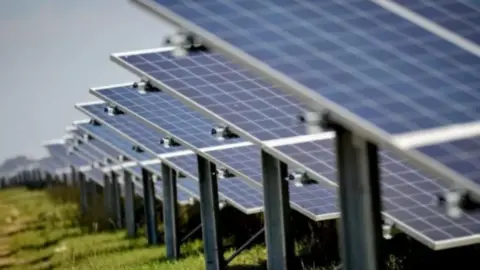Solar farm approved despite opposition
 PA Media
PA MediaA controversial plan for a 200-acre (0.8-sq-km) solar farm has been approved, despite objections from residents.
Much of the opposition to the development near Reepham, Norfolk, was to it being built on "good quality" agricultural land.
But Albanwise Synergy – whose parent company owns almost 15,000 acres (60.7-sq-km) of land in the county – said the firm was still focused on food production.
Broadland District Council's planning committee approved the Pettywell solar farm, which the developers said would power 14,000 homes.
Following almost two hours of discussion, four councillors voted in favour of the plans, with three against.
More than 80 objections had been registered with the council, with Reepham Town Council and Broadland and Fakenham's Conservative MP Jerome Mayhew also voicing concerns about the farm.
 Paul Moseley/BBC
Paul Moseley/BBCOne of the main campaigners against the solar farm was Hugh Ivins, a former planning consultant who lives next to the site, which has been used to grow crops including spring barley, vining peas and sugar beet.
"In our view, it is more important to use that land for food production rather than energy," he told the BBC.
A report from council officers said 87% of the proposed site was "grade 3a" – which the government describes as "good quality agricultural land".
But they said the site was used to produce "commodity crops" which "the UK has had a net surplus of such crops in nine of 10 years".
Meanwhile, government adviser Natural England had not objected on the basis that the solar farm should be removed after 40 years, and the land could be used for farming again.
Recommending it for approval, council officers said the site would "provide a source of clean green renewable energy" for 14,000 homes.
Albanwise is one of the biggest private landowners in Norfolk, and its project manager, Chris Banks, said the company was "diversifying".
"It also taps into those needs of putting in clean renewable energy to help support our system and decrease the reliance on foreign energy imports," he said.
"We are progressing the project alongside our much broader food production operations," he added.
Asked if the firm had plans to convert other parts of its estate into solar farms, Mr Banks said it was "always being considered" but it was dependent on whether sites could be connected to the power network.
Follow Norfolk news on BBC Sounds, Facebook, Instagram and X.
